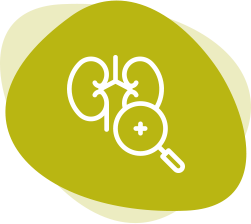Policy Priorities
A top priority for KTC is advocating for policies that will increase kidney transplants and reduce the financial and other unnecessary barriers to transplantation for recipients, donors, and their families.

Enact The Living Organ Volunteer Engagement (LOVE) Act

Expand Living Donor Expense Reimbursement

Expand the Paired/Chain Living Donor Program
Enact The Living Organ Volunteer Engagement (LOVE) Act
KTC is advocating for much needed legislation to increase the number of kidney transplants from living donors.
With approximately 93,000 Americans currently waiting for a kidney transplant and tens of thousands more in need of a transplant but not yet on the waiting list, something must be done. Living kidney donation is safe, ethical, and has been effective for decades. Unfortunately, it happens far too infrequently to help those in need. KTC encourages Congress to enact the Living Organ Volunteer Engagement (LOVE) Act to increase kidney transplants and save lives. Increasing donations has also been documented to save the federal government significant funds.
Resources
 Presentation - Living Donor Kidney Transplantation - A Failed American Enterprise
Presentation - Living Donor Kidney Transplantation - A Failed American Enterprise
 One-Pager - The Living Organ Volunteer Engagement (LOVE) Act
One-Pager - The Living Organ Volunteer Engagement (LOVE) Act
 One-Pager - The Living Organ Volunteer Engagement (LOVE) Act - Section by Section
One-Pager - The Living Organ Volunteer Engagement (LOVE) Act - Section by Section
 Draft Legislation - The Living Organ Volunteer Engagement (LOVE) Act
Draft Legislation - The Living Organ Volunteer Engagement (LOVE) Act
 Analysis - The Economic and Budgetary Impact of the Living Organ Volunteer Engagement (LOVE) Act
Analysis - The Economic and Budgetary Impact of the Living Organ Volunteer Engagement (LOVE) Act
 Response Letter - KTC Comments on OPTN Reform Proposal
Response Letter - KTC Comments on OPTN Reform Proposal

Expand Living Donor Expense Reimbursement
KTC will work to advance the Organ Donation Clarification Act of 2021 and find solutions to help cover donors’ costs to increase living donation rates.
Every effort should be made to make living donation financially neutral. In 2020, the Health Resources and Services Administration (HRSA) modestly increased living donor expense reimbursements to help cover external costs associated with lost wages and dependent care due to kidney donation. Unfortunately, this only applies to individuals with income below 350% of the federal poverty level (the prior threshold was 300%). Studies have demonstrated that covering donors’ costs will lead to an increase in living donation rates. KTC, working with other stakeholders, will work to advance H.R. 3569, the “Organ Donation Clarification Act of 2021” introduced by Representative Matthew Cartwright and Representative Joe Wilson along with 11 other House members, and clarify the law by authorizing the U.S. Department of Health and Human Services (HHS) to create a five-year government pilot program to model donor expense reimbursements. By clarifying the law and empowering the HHS Secretary to create the pilot program, we can ensure that living donors are not burdened with unnecessary expenses due to their altruistic decisions.
Resources

Expand the Paired/Chain Living Donor Program
KTC will pursue legislative opportunities to enhance the work being done to expand living donations in the coming years.
Although much is currently being done to improve the existing donation process, an additional opportunity exists to expand paired donation opportunities when potential donors are not a match for a loved one in need of a kidney transplant. To date, the federal government has not allocated any resources to support a paired donation program, leaving the not-for-profit community filling the void. KTC will pursue policy opportunities to expand paired and chain donation solutions and to work with stakeholders to enhance the existing work already being accomplished with the overarching goal of significantly increasing living donations.

Comment Letters
KTC Comment Letter to The Honorable Chi Chiquita Brooks-LaSure, Administrator, Centers for Medicare and Medicaid Services Department of Health and Human Services
January 31, 2022
Request for Information, Health and Safety Requirements for Transplant Programs, Organ Procurement Organizations and an End-Stage Renal Disease Facilities.
KTC Comment Letter to Health Resources and Services Administration
May 9, 2022
Request for Information by the Health Resources and Services Administration regarding the Organ Procurement and Transplantation Network (OPTN).
